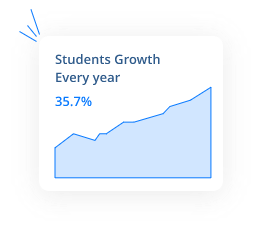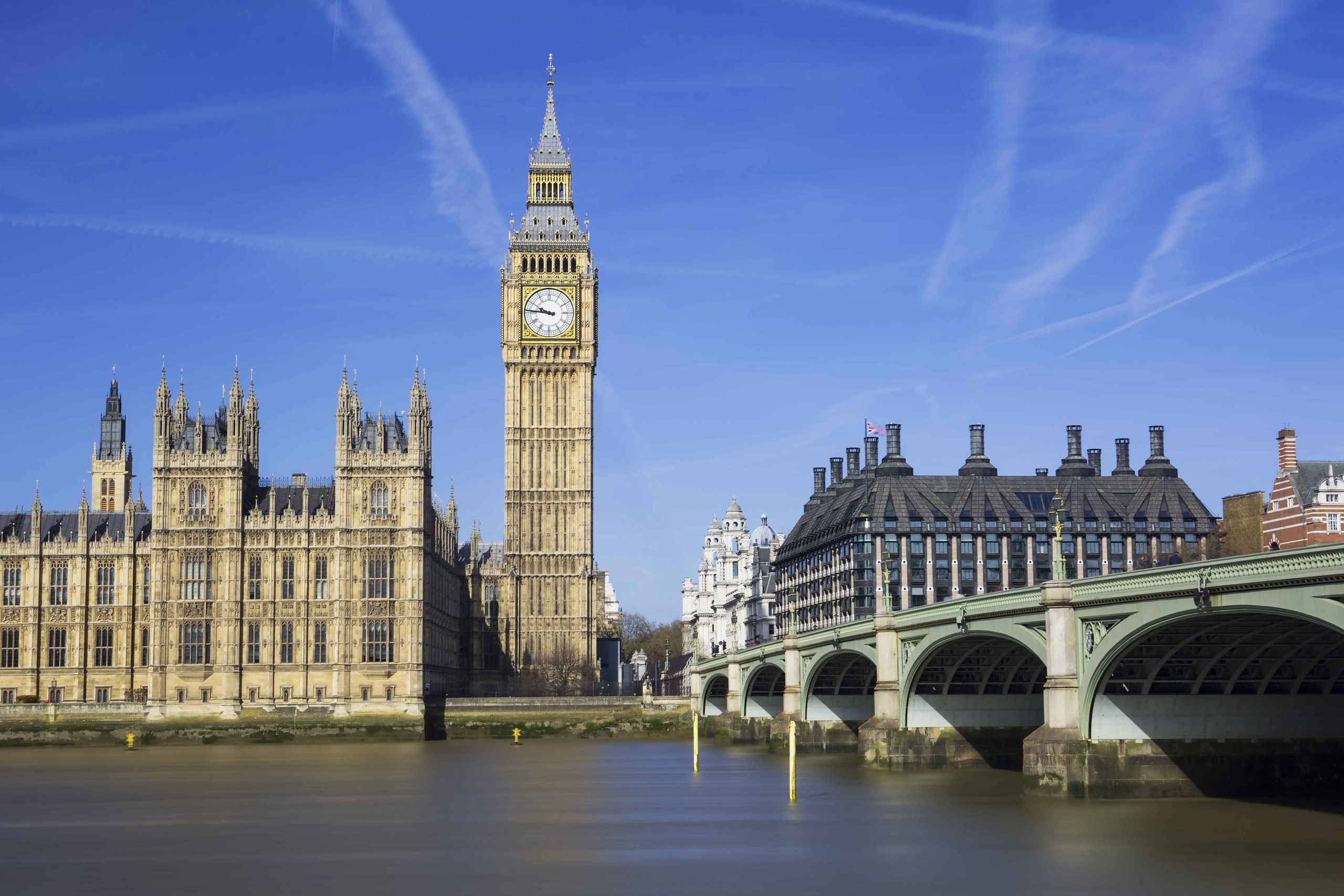Study in UK
Create your path to excellence!



Study in UK from Bangladesh
The United Kingdom (UK) is an optimal study abroad destination with over 150 esteemed universities, which enriches students’ academic and career prospects. Every year, millions of students study in the UK in various programs like MBA, Engineering, 1-Year Master’s, Nursing, etc. Based on the UK Government’s official data, higher education institutions nearly doubled in the UK, reaching 433,102 in March 2023 from 222,047 in September 2019. Similarly, 498,626 study visas were granted in 2023, a 22% increase from the year ending March 2022.
The number of Bangladeshi students choosing to study in the UK is on the rise. In 2023, over 6,586 Bangladeshi students embarked on academic journeys in the UK, creating a vibrant and supportive community.
With its world-class education, diverse programs, and flourishing international student community, the UK offers an exceptional opportunity for Bangladeshi students to excel. Start your exciting future today – explore the possibilities of studying in the UK from Bangladesh!
Why Study in UK?
Studying in the UK appeals due to its globally recognised universities, advanced research opportunities, international exposure, and rich cultural experiences, making it a top choice for higher education. Choosing to study in the UK is a smart move for international students. The UK is known for great education and a rich history of learning. The country is adorned with captivating cities like Edinburgh, Manchester, Birmingham, and Glasgow. Moreover, UK universities are among the best globally ranked, like the University of Oxford, University of Cambridge, Imperial College London, and University College London.
Apart from the academic advantages, studying in the UK from Bangladesh provides valuable career prospects. Employers all around the globe value and recognize UK degrees, which increases graduates’ employability and opens doors to international career prospects. Students’ professional growth is further enhanced by networking opportunities, internships, and work placements made possible by the institutions’ strong linkages to businesses and industries.

Study in UK: Key Facts & Statistics
Languages spoken
Top UK cities to study
Intakes
Levels of Degrees
Exams required
Minimum scores required
Visa type
Study visa costs
£363
Cost of study
Around £17,109 per year
Financial aid
From the above table, it is clear that you need to have good academic records, prove English language proficiency skills, apply for Tier 4 (General) Student Visas and pay £363 as visa cost to study in UK.
Among various English-speaking countries, the UK is a welcoming, safe, and friendly destination for foreign students. It offers a helping environment for learning and personal growth. Indian students choose the UK as their preferred study abroad destination due to their high-quality education and globally recognised degrees offered by its universities.
UK colleges and universities are known for providing excellent academic standards, innovative teaching methodologies, and a strong emphasis on research. The UK presents diverse programs, from Business Management, Engineering, and Computer Science to Arts, Medicine, and Environmental Studies, enabling students to align their choices with their goals.
Top 10 Benefits of Studying in UK
The UK is well known for its excellent educational system, wide range of postsecondary educational options, and high employment rates. International students enjoy a wide range of study opportunities, including short diplomas, certifications, bachelor’s and master’s degrees, and specialized courses, thanks to more than 100 government-funded and private universities. Offering diplomas and one-year master’s programs, each with a fast-paced, comprehensive curriculum that expedites entry into the UK employment market, is a special advantage of studying in the UK.
- Lots of Study Options: The UK is known for its excellent schools and universities (over 100!). You can choose from many programs, like short courses, certificates, Bachelor’s degrees, Master’s degrees, and specialized programs to fit your goals. Plus, the UK offers unique options like fast-paced 1-year Master’s programs to help you get a job quickly.
- Fast-Paced Learning: The UK offers unique programs like 1-year Master’s degrees. These programs are intense but will get you into the job market quickly.
- Easier Visa Application: The Student Direct Stream (SDS) makes applying for a visa simpler. There are also many affordable study options to choose from.
- Work After Graduation: Once you graduate, you can stay and work in the UK for up to 2 years with the Graduate Route visa. This is a great chance to build your career!
- Improve Your English: Studying and living in an English-speaking country like the UK is a fantastic way to improve your English skills, making you a stronger candidate for jobs worldwide.
- Scholarships Available: Scholars like Chevening and GREAT help Bangladeshi students afford their studies in the UK.
- Top Universities: The UK has some of the best universities in the world, like Oxford, Cambridge, and Imperial College London. These universities offer a top-quality education.
- Strong Education System: The UK education system is known for its high quality, giving you a strong foundation for your future career.
- Financial Help for International Students: Over 80 scholarships and financial aid programs are available to help international students study in the UK.
- Build a Powerful Network: Being a UK graduate gives you access to a vast network of former students (alums) who can help you in your career.
- Grow as a Person: Living in the UK will expose you to different cultures, which will help you become more independent, adaptable, and open-minded.
- Strong Foundation for Success: The UK education system is respected worldwide. Studying here will give you a solid foundation for a successful future.post-secondary
Popular Courses to Study in UK
Top-tier universities in the UK take a hands-on learning approach in their pedagogical system. It means students learn by doing real-world tasks. Students pick their favourite courses from Business, Engineering, Computer Science, Medicine, Data Science, Artificial Intelligence, Cybersecurity, Social Sciences, and Arts through three main types of degrees: Bachelor’s, Master’s, and Doctoral research programs. The list of popular courses to study in the UK is given below based on global needs:
- Business Management and Entrepreneurship
- Medicine
- Law
- Social Sciences
- Media and communication
- Data Science and Analytics
- Artificial Intelligence and Machine Learning
- Cybersecurity and Information Security
- Nursing and Healthcare Management
- Biomedical Science and Bioinformatics
- Public Health and Epidemiology
- Digital Marketing and Communications
- Engineering and technology
- Finance and Accounting
- Hospitality and Tourism Management
- Architecture and Urban Planning
The list of top courses in the UK for international students with average annual tuition fees are given in the table below.
Name of the courses/ programs
Average Annual tuition fees in GBP and INR
Course Duration
Business Management and Entrepreneurship
BA- £13,000 MSc- £78,000
1 - 2 years
Medicine
£22,000 - £52,000
5 - 6 years
Law
£19,500 to £44,000
3 - 4 years
Social Sciences
£12,000 - £45,000
3 - 4 years
Media and communication
£15,000 - £32,000
2 - 3 years
Data Science and Analytics
£19,000 - £40,000
1 - 2 years
Artificial Intelligence and Machine Learning
£14,010 - £48,500
1 - 2 years
Cybersecurity and Information Security
£24,000 - £32,000
1 - 2 years
Nursing and Healthcare Management
£15,000 - £30,000
2 - 4 years
Biomedical Science and Bioinformatics
£15240 - £24,000
2 - 3 years
Public Health and Epidemiology
£17,200 - £37,800
1 - 2 years
Digital Marketing and Communications
£18,123
1 - 2 years
Finance and Accounting
UG - £9,250 , PG - £32,151.06
2 - 3 years
Architecture and Urban Planning
£20,000 - £50,000
3 - 5 years
Top Universities to Study in UK
University Name
University Known For
QS World University Rankings 2024
Times Higher Education 2023
Tuition Fee per year (INR)
University of Cambridge
Renowned for academic excellence and historic legacy
#2
#3
Cambridge, UK
University of Oxford
A leading institution with a rich scholarly tradition
#3
#1
Oxford, UK
Imperial College London
Focus on science, engineering, and medicine
#6
#10
London, UK
University College London
Multidisciplinary university in the heart of London
#10
#16
London, UK
London School of Economics and Political
Specialises in social sciences and economics
#45
#37
London, UK
University of Edinburgh
A broad range of programs and strong research
#22
#29
Edinburgh, UK
Kings College London
Known for health sciences and humanities
#40
#38
London, UK
University of Manchester
A Russell Group member and research-intensive
#32
#54
Manchester, UK
University of Bristol
Research-oriented with a strong student community
#55
#76
Bristol, UK
University of Glasgow
Broad curriculum and best student life
#76
#82
Glasgow, UK
Best Places to Study in UK
For a better educational experience, knowing which UK cities are the finest for students is essential. Cities in the UK provide an all-encompassing experience, from vibrant cultural centers to top-notch academic institutions. Discover premier student towns with many options, such as Manchester, Edinburgh, and London. Learn about the unique qualities and educational opportunities to select the top UK study destinations.
- Oxford: In South East England, Oxford is affectionately known as the ‘City of Dreaming Spires’. Its picturesque charm is enhanced by its historic architecture and status as home to some of the world’s oldest universities. The annual course fees for students here typically amount to £9,250.
- London: As the capital city of England and the United Kingdom, London is a bustling metropolis in the southeastern region. It boasts numerous prestigious universities, including Imperial College London, University College London (UCL), and the London School of Economics and Political Science (LSE)—tuition fees in London range from £9,250 to £67,892 per year.
- Liverpool: Located in northwest England along the Mersey Estuary, Liverpool is renowned for its maritime history and cultural heritage. Notable landmarks include the iconic Liverpool Cathedral. The average tuition fees for students here fall between GBP 21,000 and GBP 40,000 annually.
- Bath: Situated in the southwest of England, Bath is famous for its natural hot springs and elegant Georgian architecture. The city is home to the University of Bath, particularly acclaimed for engineering, architecture, and social sciences programs—tuition fees in Bath range from £3,120 to £37,500 per annum.
- Birmingham: Located in the West Midlands region, Birmingham is a diverse city with a rich industrial legacy and a thriving cultural scene. The average tuition fee for students here ranges from INR 9.8 Lakhs to 19.2 Lakhs annually.
- Edinburgh: As the capital city of Scotland, Edinburgh is steeped in history and culture, boasting landmarks like Edinburgh Castle and the Royal Mile. Tuition fees in Edinburgh typically hover around GBP 29,000 to 35,000 annually.
- Glasgow: Scotland’s largest city, Glasgow, situated in the west of the country, is celebrated for its cultural offerings, art galleries, and vibrant music scene. It hosts institutions like the University of Glasgow and the University of Strathclyde, with tuition fees ranging from GBP 6,800 to GBP 53,460 per annum.
- Newcastle upon Tyne: Located in the northeast of England, Newcastle upon Tyne, commonly known as Newcastle, offers an energetic nightlife and rich historical attractions. Tuition fees here average between GBP 19,200 to GBP 24,300 per year.
- Cardiff: As the capital of Wales, Cardiff is famous for its cultural festivals and Cardiff Castle. Cardiff University offers a wide range of academic programs, with tuition fees ranging from £12,000 to £22,000 per year.
- Manchester: A major city in northwest England, Manchester boasts a rich industrial heritage and a thriving music scene. The University of Manchester, one of the UK’s largest and top institutions, is here. Average tuition fees in Manchester typically range from £12,200 to £44,800 per annum.
- Coventry: Situated in the West Midlands region, Coventry is notable for its history and is home to innovative programs at Coventry University and the University of Warwick. The average tuition fee in Coventry generally falls between £20,050 to £24,050 per year.
How to Study in UK?

UK Student Visa Requirements
To study in the UK, aspirants need the UK Student Visa, commonly known as the Tier 4 Visa, to study full-time courses. If applicants seek shorter courses, a Visitor Visa might be necessary. Typically, students receive a visa decision within three weeks, so applying in advance is essential. The cost for a UK study visa is £363 (INR 38,507 approx.) for applications from outside the UK. The UK Student Visa is a part of the Points-Based System (PBS) established by the UK government to manage immigration. For more information about student visas or study permits, visit the UK government’s official website or contact the local British embassy/consulate.
Student Visa Requirements for UK
- Valid passport
- Confirmation of Acceptance for Studies (CAS)
- Passport-size photographs
- Academic transcripts
- Valid ATAS certificate (if applicable)
- Documentation confirming parental or legal guardian consent (for applicants under 18)
- Proof of relationship to parent/guardian (if under 18)
- Tuberculosis test results
- Written authorisation from financial sponsor (if sponsored in the last 12 months)
- Financial proof to support course fees and living expenses
- The advisable funds are £1,334 per month (London) / £1,023 per month (outside London) for up to 9 months
- For language requirements, students must get a score Equivalent to CEFR level B2 for Degree level or above, CEFR level B1 for below degree level.
- Applying from outside the UK: Prove identity, fingerprints, and photograph (biometric information), Use ‘UK Immigration: ID Check’ app for identity documents or scan Create/sign into UK Visas and Immigration (UKVI) account
Intakes to Study in UK
Study intakes refer to specific periods when universities in the UK offer academic programs, allowing students to start their studies. International students must grasp these intake cycles, as they affect application deadlines, course availability, and visa processing times. The three intakes in UK are September (Fall), January (Winter), and May Intake (Spring) (least preferred).
September Intake: The September or Fall intake is the most popular and widely available. It aligns with the start of the academic year, offering a comprehensive range of courses and opportunities for internships, jobs and networking.
January Intake: The January or Winter intake provides an alternative entry point for students who missed the September intake or want to start fresh in the new year. It might have fewer courses available compared to September, but it offers a chance to avoid the competition for popular programs.
May Intake: The April intake, also known as the spring intake, is less common and offers fewer courses than the other intakes. It could suit those seeking specialised programs or having specific scheduling preferences.
Semester Intakes
Application Deadline
Intake duration
September/Fall Intake
January - June
September to December
January/ Winter Intake
September - November
January to April
May/Spring Intake
Late April - End of April
April to June
What are the requirements to study in the UK?
Aspiring international students must meet various requirements to pursue education in the UK. These include academic requirements like specific grades or qualifications, English language proficiency test score requirements (such as IELTS, TOEFL, etc.), financial evidence to support living and tuition expenses, and obtaining a Student Visa. We have gathered and shared complete details about these requirements from trusted sources, guaranteeing accuracy and reliability.
Academic Qualifications
From undergraduate to postgraduate and research programs, we’re here to guide you through your academic needs. Our comprehensive list of information includes details about minimum English proficiency test scores, educational qualifications, and other vital criteria.
Bachelor’s degree
- A recognised secondary/high school completion certificate or equivalent, like A-levels, IB Diploma or similar qualifications from your country.
- Minimum IELTS score of 6.0 and above, TOEFL scores ranging from 72 to 100, CAE scores between 180 and 230, or an overall PTE Academic score of 51 and higher
Master’s degree
- A recognised bachelor’s degree or equivalent from a reputable institution. The grade requirements or classification varies based on the university and program.
- Minimum IELTS score of 6.5 and bachelor’s above, TOEFL scores ranging from 79 to 100, CAE scores between 180 and 230, or an overall PTE Academic score of 58 and higher.
Diploma
- Diploma courses require a minimum level of educational qualifications. For example, 10th or 12th standard.
- A recognised secondary/high school completion certificate or its equivalent.
- Minimum IELTS score of 5.5 to 6.0, TOEFL scores between 60 and 79, or PTE Academic scores or from 42 to 58.
Doctoral Degree
- Candidate should hold a masters degree or an equivalent educational qualification, such as an MPhil (Master of Philosophy) or MA (Master of Arts), from a top institution. In some cases, candidates with a bachelors degree might be considered if they have exceptional research experience or achievements.
- Students should submit a detailed research proposal objectives, hypothesis, research methodology, potential results, and sources of their submitted research project. This shows your capability for independent research and contributions to the field.
- Minimum IELTS score of 6.5 to 7.0, TOEFL scores ranging from 90 to 100, or PTE Academic scores between 58 and 65 as an English proficiency proof.
- At some universities, they might want to conduct interviews as part of the admission process. This helps them see if the applicant is a good fit for the program and if they can do well in research on their own.
Documents Required for Studying in UK for Bangladeshi Students
Cost of Studying in UK
The cost of studying in the UK ranges from £10,000 to £38,000 per year. Similarly, it is £4,625 per semester and £2,312 per quarter/term. It covers tuition fees, accommodation, food, travel, and other expenses, varying by program, location, university, and level. The UK government supports international students with scholarships and aid. Moreover, it helps Bangladeshi students estimate their expenses accurately by considering internal and external factors, lifestyle, and university choices.
Course Level
Average Cost in GBP per Year
Average Cost in INR per Year
Diploma
A minimum of GBP 9,260
BDT 1,294,231
Undergraduate
GBP 10,000 to GBP 20,000 per year
BDT 1,397,657- 2,795,315
Graduate
GBP 10,000 to GBP 20,000 per year
BDT 1,397,657- 2,795,315
MBA
GBP 15,000 to GBP 30,000 per year
BDT 2,096,486 - 4,192,973
PhD
GBP 10,000 to GBP 30,000 per year
BDT 1,397,657- 4,192,973
Doctoral
GBP 15,000 to GBP 24,000 per year
BDT 2,096,486- 3,354,378
Get ready to
Study Abroad

https://niecbd.com
Scholarships to Study in UK Universities
Scholarships are funds awarded to eligible students in the UK to cover their education costs, with values and criteria varying by the host institution. Scholarships are provided by various sources, including the UK government, educational institutions, private organisations, and international bodies. To promote international educational exchange programs, the government offers UK scholarships for Indian students. Students should research and apply for scholarships aligning with their academic achievements, field of study, and financial needs.
Check out the notable scholarships available for international students studying in the UK.
S.no
Name of the UK Scholarship
Description
Scholarship Amount
01
Chevening Scholarship
UK governments global scholarship program for international students, covering tuition, living expenses, and more.
up to £18,000
02
Commonwealth Scholarship and Fellowship
Funded by the UK government, open to students from Commonwealth countries, offering various study levels and fields.
Over £1,000 every month
03
GREAT Scholarship
Collaboration among UK universities to provide scholarships for students from specific countries, promoting cultural exchange.
£10,000
04
Charles Wallace India Trust Scholarships (CWIT)
Supports Indian students academic and professional development through grants and fellowships.
£ 1,500
05
Scotland Saltire Scholarships
Scholarships for students from Canada, China, India, Japan, Pakistan, and the USA to study in Scotland.
£8,000
06
Mackenzie King Memorial Scholarships
For Canadian graduates to study in the UK, with emphasis on leadership and public service.
Over £8,225
07
BAFTA Scholarships
Scholarships for talented individuals pursuing careers in film, games, or television industries.
Maximum of £20,000 for 2 year courses
08
Inlaks Scholarship
Supports Indian students for postgraduate courses at top international universities, including the UK.
up to £78,335
09
Global Study Awards
Aimed at encouraging students to study abroad, covering travel, accommodation, and academic expenses.
A maximum value of £10,000
10
Rhodes Scholarships
Prestigious award for postgraduate study at the University of Oxford, based on academic excellence and leadership.
£17,310 (INR 1755470) per annum
11
Erasmus Mundus
Joint masters and doctoral programs offered by European universities, including UK institutions.
£3,838 per year for a Programme Country scholarship holder. £7,677 per year for a Partner Country scholarship holder.
12
UK Excellence Scholarship
Merit-based scholarship for high-achieving international students studying in the UK.
£5,000
13
Gates Cambridge Scholarship
Fully-funded scholarship for outstanding postgraduate students at the University of Cambridge.
Between £30,000 - £45,000 per year
14
Oxford Pershing Square Scholarship
Supports exceptional MBA students at the University of Oxford pursuing social impact projects.
£15,609
Education Loan for Studying in UK
Covering the costs of education and living expenses while studying in the UK can be tough on your wallet. But don’t worry; education loans from public and private sources are available for your rescue. To get an education loan, the common eligibility criteria are strong academic records, admission to a leading UK institution, and a co-signer.
Here are the expenses that are commonly covered under education loans for studying in the UK:
- Tuition Fees
- Accommodation Costs (including rent and utilities)
- Travel Expenses (flights, cab or taxi, other transportation)
- Study Materials (books, supplies, equipment)
- Living Expenses (food, personal expenses)
- Health Insurance
- Visa Fees and Application Costs
- Exam Fees (IELTS, TOEFL, etc.)
- Research Expenses
- Other Academic Costs (workshops, seminars)
- Placement and Internship Expenses
- Miscellaneous Costs
Cost of living in UK
The average cost of living in the UK is around £12,000 per year, including house rent, utilities, transportation, groceries, and leisure. Living in the UK, especially in popular cities like London, Edinburgh, and Manchester is expensive. The UK offers free healthcare through the NH as a safety net.
Expenses
Cost (per month)
Bills (electric/ gas/ water)
£40 - £50
Accommodation like 1bhk, 2bhk, appartments (Private)
1 bhk - £600 - £700, 2 bhk - over £ 1000
Accommodation (shared)
£400 - £800
Food and housekeeping
£160 - £200
TV licence (mandatory with TV or watching BBC online)
£12.56 (or £150.50 per year)
Mobile phone
£15 - £50
Public Conveyance
£54
Clothes and shoes
£25
Leisure and sports (calculated on membership for the students’ sports centre)
£10 - £20
Books and stationery
£21
Socialising
£120
Health insurance
£50 - £100
Travel and transport (based on the monthly cost of a student bus pass)
£32
Childcare (if needed)
£656
Post-Study Work Opportunities in UK for International Students
The UK provides post-study work opportunities for international students after completing their degrees. The UK Graduate Route Visa lets students stay and work for 2 years (3 years for Doctoral students) post-graduation. The National Living Wage has increased the UK average salary by £10.42 per hour for international students. To get a UK Graduate Route Visa, students pay a £715 application fee and a £624 annual healthcare surcharge. This guarantees valuable work experience and potential employment options. After the visa expires, students can apply for skilled work visas, like the Tier 2 visa, and continue their careers.
To apply for an open work permit under the UK’s Graduate Route, aspiring candidates need to submit the following documents:
- Valid Passport
- Biometric Residence Permit (BRP)
- Confirmation of Award or Certificate of Qualification
- Tuberculosis (TB) Test Results (if applicable)
- Proof of Financial Sustainability
- Health Surcharge Payment Receipt
- Passport-size Photographs
The table below shows the job positions and average annual salary in GBP and BDT, respectively.
Job Roles
Average annual salary in GBP
Average annual salary in INR
Additional Information
Software Engineer
£59,235
BDT 8,279,024 approx
Expertise in programming languages
Financial Analyst
£54,600
BDT 7,631,210 approx.
In-depth financial market knowledge
Graphic Designer
£35,009
BDT 4,893,059 approx.
Proficiency in Adobe Suite
Research Scientist
£53,766
BDT 7,514,645 approx.
Scientific research acumen
Business Analyst
£54,424
INR 57,57,755 approx.
Strong analytical skills
Marketing Executive
£40,807
INR 43,17,413 approx.
Creativity in campaign planning
Hospitality Manager
£36,700
INR 38,82,837 approx.
Strong leadership in hospitality
Nurse
£38,714
INR 40,95,917 approx.
Compassionate patient care
Data Analyst
£42,929
INR 45,41,862 approx.
Data visualisation expertise
Human Resources Manager
£57,113
INR 60,42,521 approx.
Employee relations expertise
Frequently Asked Questions
The cost of studying in the UK can vary depending on factors such as the chosen university, program, and location. On average, undergraduate courses can cost between £10,000 to £30,000 per year, while postgraduate courses can range from £10,000 to £40,000 per year.
Yes, most universities in the UK require international students to provide proof of English language proficiency, and the IELTS is widely accepted for this purpose. However, some universities may also accept other tests like TOEFL, PTE, Duolingo or Cambridge English qualifications.
The cost of studying in the UK can be higher compared to some other countries and cheaper than the US, but the quality of education and the value of the degree are often seen as excellent. While tuition fees and living expenses can be relatively high, there are various scholarships, grants, and part-time work opportunities available to help offset the costs.
To study in the UK from India, you need to follow these steps:
Research and explore universities and programs that match your interests and qualifications.
Apply and complete the university application process, which may include submitting academic transcripts, a personal statement, Test Scores for SAT/ GMAT/ GRE (as per the course), English proficiency test scores of IELTS/ TOEFL/ PTE/ Other (as per the course) and references.
For visa application, apply for a Tier 4 (General) student visa from the UK Visa Application Centre in India.
Provide evidence of sufficient funds to cover tuition fees and living expenses.
Get complete health insurance coverage.
Plan your travel and accommodation arrangements.
Yes, you can pursue undergraduate studies in the UK after completing your 12th-standard education in India. Many UK universities offer a variety of undergraduate programs. UK university applications usually require 50-60% high school grades and strong English proficiency.
After completing your studies in the UK, you may be eligible to apply for a post-study work visa or other immigration routes that could lead to permanent residency. The exact process and requirements depend on the immigration policies at the time of your study completion. Generally, you may need to secure a job offer in a skilled role, meet minimum income thresholds, and fulfil residency requirements.
The most common English language proficiency exam required for studying in the UK is the International English Language Testing System (IELTS). Other accepted tests might include TOEFL, PTE, Duolingo or Cambridge English qualifications. Additionally, for some courses, you might need to take standardised tests like the SAT, ACT, or subject-specific tests.
The main intakes for studying in the UK are typically in September. The September intake aligns with the academic calendar, and a larger number of courses are available.
While its less common to find 100% funded scholarships for international students in the UK, there are various scholarships, grants, and financial aid options available. Some scholarships can cover tuition fees partially, and others might include living expenses
While its less common to find 100% funded scholarships for international students in the UK, there are various scholarships, grants, and financial aid options available. Some scholarships can cover tuition fees partially, and others might include living expenses
The UK is home to many big global companies, and it has a wide range of important recruiters from large international firms to smaller businesses. Here are some of the top recruiters in the UK:
- PwC
- Deloitte
- KPMG
- EY
- Amazon
- Unilever
- J.P. Morgan
- Goldman Sachs
- McKinsey & Company
- Rolls-Royce
- British Airways
Applicants aged 16 and above can apply for a UK Student visa for further or higher education. Candidates should have confirmation of acceptance from a reputed UK institution, acceptable English Language proficiency scores like IELTS, and proof of financial capability. This involves showing approximately £1,334 per month (up to 9 months) for London courses and £1,023 per month (up to 9 months) for courses outside London. A licensed Tier 4 sponsor is also required for sponsorship.
- Research: Gather information about your desired course and university in the UK.
- Course Acceptance: Obtain an acceptance letter from a top UK educational institution.
- Visa Type: Determine the appropriate student visa category based on your course duration.
- Create an Account: Register for visa application on the official UK government website.
- Online Application: Complete the visa application form online.
- Visa Fee: Pay the required visa application fee online.
- Biometrics Appointment: Schedule and attend a biometrics appointment at a Visa Application Center (VAC).
- Submit the Required Documents
- Mode of Application: Apply online through the official UK government website.
- Attend Interview: If requested, attend an interview at the VAC.
- Visa Processing: Wait for your visa application to be processed.
- Visa Decision: Applicants outside the UK usually receive visa decisions by email within 3 weeks, while those within the UK receive decisions within 8 weeks.


